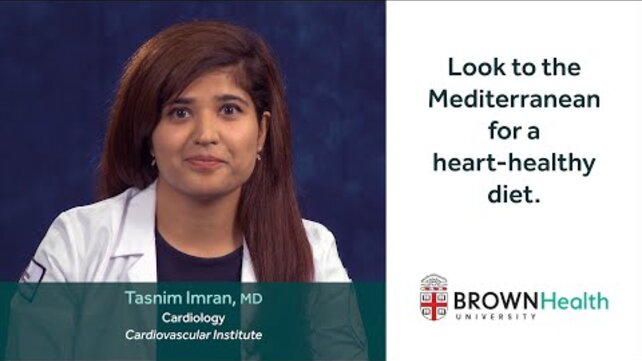Contact the Brown University Health Cardiovascular Institute
For more information, or to schedule an appointment with the Brown University Health Cardiovascular Institute, please call 1-855-332-8474.

Diet and nutrition play a large part in heart health. Certain foods can influence blood pressure, cholesterol levels, and inflammation, which are contributing factors to heart disease. It is important to keep these vitals under control, as healthy levels are the first line of defense against heart disease.
For more information, or to schedule an appointment with the Brown University Health Cardiovascular Institute, please call 1-855-332-8474.
A diet that includes foods that lower blood pressure, fight inflammation, and reduce LDL cholesterol will reduce your risk of heart disease and support heart health.

Tasnim Imran, MD, a Brown University Health consultative cardiologist, talks about looking to the Mediterranean for the building blocks of a heart healthy diet.
Fried, processed, and sugary foods that are often associated with being unhealthy are also bad for your heart. Consuming high amounts of foods containing saturated fat, sodium, trans fats, and sugar can raise blood pressure, increase cholesterol levels and increase inflammation.
Some lifestyle changes are essential to lowering your heart disease risk. Along with a heart-healthy diet, smoking cessation will support overall health as well as heart health. Daily physical activity has also been shown to improve heart health by lowering cholesterol and keeping a healthy weight. Studies suggest that reducing stress levels may help heart health as well, as people under stress often cope by overeating, smoking, or turning to other unhealthy coping mechanisms.
A Brown University Health dietitian shares some tips that will help improve your diet and lower your grocery costs.
While they're trending right now, ancient grains have been eaten for centuries in places like China, Africa, India, and the Middle East.
Fats are a topic that often cause confusion. We share the science behind trans fats and what it means for your diet.
Our fresh, flavorful arugula quinoa salad is packed with protein and works as a side or a main course.
While moderate drinking won’t harm your heart unless you have high blood pressure, heavy drinking can lead to high blood pressure, cardiomyopathy, strokes, or heart disease. The accepted rule for alcohol consumption is no more than two drinks per day for men and no more than one drink per day for women. If you don’t drink, it is not recommended to begin or for drinkers to increase the amount they drink.
If you are allergic, vegetarian, vegan, or have other dietary restrictions that prevent you from including some of the heart-healthy options in your diet, you can take supplements and vitamins to get the same benefits. Look for Coenzyme Q10 (CoQ10), fish oil or omega-3, and magnesium. You can also add garlic to your foods, as it has been shown to support heart health. Green tea lowers LDL cholesterol, increases “good” HDL cholesterol, and keeps blood sugar levels in check.
After suffering a major heart attack, Walter's biggest victory was walking back into his office. Learn how the Brown University Health Cardiovascular Institute helped make that possible.